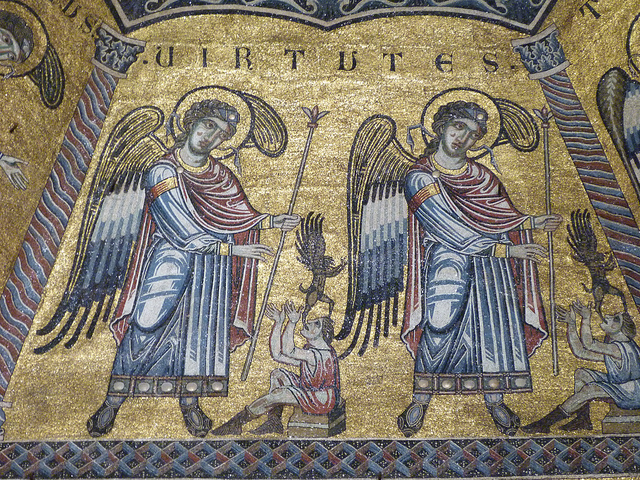
Recently it has been suggested that the concept of virtue can be understood as something like a skill. Like a skill, virtue is a disposition that requires habituation, where such habituation, however, cannot be reduced to mere routine. It has been central to this view that these two modes of practical knowledge, skill and virtue, are clearly distinguishable from mere habits.
According to this picture, skill and virtue are particular species of the more general categories of “acquired capacities” and “acquired tendencies.” Both rational and sub-rational animals are meant to have acquired capacities and acquired tendencies. A trained dog is said to have the capacity to control its sphincters, and if it is well behaved, it tends to exercise this capacity. An adult person has the capacity to fulfill her promises, and if she is virtuous, she will tend to fulfill them. According to this picture, only the capacities and tendencies of human beings are rational. The capacities of sub-rational creatures are mere habits. Thus skill and virtue are conceived as the rational species of two more general categories, acquired capacity and acquired tendency. They are meant to be more general because they also apply to sub-rational animals. I call this the Modern Approach to habit. It rests on the assumption that the contrast between acquired and not acquired capacities and tendencies, i.e. between habituated and non-habituated capacities and tendencies, is intelligible independently of the rational sub-categories.
I criticize this view and oppose to it what I call the Orthodox Doctrine of habit endorsed by Aristotle, Aquinas and Hegel. On this view, the relation between capacity and tendency on the one hand, and habit on the other hand, is not the relation between a genus and a species. Rather, habit is a formal feature that properly belongs to the idea of a rational power. According to this doctrine, sub-rational animals cannot, properly speaking, have habits; only rational animals are creatures of habit. While mere animals possess their capacities “immediately” or “by nature”, humans equip themselves with a “second nature” through repeated actions. A human is the creation of her own activity.
The opposition between the Neo-Aristotelian and the orthodox doctrines of habit thus comes to this: on the Neo-Aristotelian conception of the distinctions within the general category of capacity, the opposition rational/sub-rational is applicable to the concept of habit. There are rational as well as sub-rational habits. According to the orthodox doctrine, the rational/sub-rational opposition is not applicable to habit, since the latter constitutes a structural moment of rational capacities. There are no sub-rational habits. There are only good and bad habits: i.e. the two ways in which a rational capacity can be actualized. The wisdom of this orthodox doctrine is evident from the difficulties afflicting the Neo-Aristotelian account. So let us consider habit in its three principal dimensions: acquisition, act, and subject.
In the categorical framework of Neo-Aristotelianism, the conceptual capacities distinctive of humankind form a sub-category of acquired dispositions. Let’s assume for the moment that this is correct. What are we to say of those exemplars of our species who have yet to acquire any second nature? What are we to say of our first nature? John McDowell gives the following response: “Human infants are mere animals, distinctive only in their potential.” McDowell does not maintain that newborns belong to the class of beasts and brutes; he rather advances the thesis that the distinction between us and animals obtains at the level of first nature. An infant differs from mere animals not through its activities but through its as-yet unactualized capacities, its predispositions. Thus, when, in the course of their development, children acquire conceptual abilities and tendencies, they are actualizing a capacity that they were born with. In other words, human infants differ from mere animals by virtue of a second-order capacity, a capacity to acquire abilities. A rational second nature is thus the actualization of a second-order capacity that is in-born, and hence a first nature.
But if this capacity distinguishes us in virtue of our first nature, then the question arises as to whether the capacity to acquire rational capacities is itself a rational capacity. For mere animals can have a second nature as well, and therefore have the ability to acquire abilities. The capacities that they acquire, however, are—unlike ours—not rational. The question is what this means for the corresponding second-order capacities. What sort of distinction is there between their second-order capacities and ours? Are ours rational?
Aristotle, Aquinas, and Hegel deny that humans think from birth. A human infant differs from a mere animal in virtue of its predispositions, not in virtue of the (supposed) fact that it thinks. Infants first acquire concepts, which are applied in judgments, through practice. So why doesn’t the problem that these predispositions must themselves be rational capacities arise here? This problem only crops up if one assumes that the rational/sub-rational contrast applies to the concept of second nature. That is what leads to the question whether the relevant second-order capacity is itself rational or sub-rational. In the context of the orthodox doctrine of habit, this question makes no sense. Wherever first and second nature – ability and power – come apart, it is already settled whether the capacity in question is rational. It is the hallmark of rational lifeforms that their essential capacities are operative in individual exemplars only as mere predispositions. The spirited actuality of the human infant – and thus its mere being as “natural spirit” – consists precisely in the inactivity, the uncultivated indeterminacy of its essential vital capacities. It is precisely this unfinished quality of the individual, this dependency that is the material perspective, whose formal complement is the original sociality of humankind.
Matthias Haase is Assistant Professor of Philosophy at the University of Chicago (beginning Fall 2016), and scholar with the project Virtue, Happiness, & the Meaning of Life.